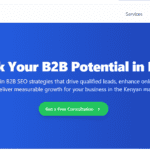SEO for B2B Services in Kenya
- Delivery Time2 Weeks
- English levelProfessional
- LocationUSA, United Kingdom, United Arab Emirates, New York, Kilimani, Kenya, Dubai, CBD Nairobi, Canada, Australia
Service Description
The cost of SEO for B2B Services in Kenya is 80000KES per month.Get SEO for B2B Services in Kenya at a price of 30000KES per month at Black Shepherd Technologies.
Boost your B2B services in Kenya with expert SEO. We drive high-quality leads and increase your brand visibility through strategic keyword research, content, and technical optimization. Partner with us to attract corporate clients and achieve sustainable growth.
In Kenya’s rapidly evolving business landscape, the adage “if you’re not online, you don’t exist” rings truer than ever for B2B service providers. Traditional marketing approaches are increasingly complemented, and often overshadowed, by the power of digital presence. At the forefront of this digital transformation lies Search Engine Optimization (SEO) – a critical discipline that, when applied strategically, can unlock unparalleled growth for B2B companies targeting the Kenyan market.
SEO for B2B services in Kenya is a specialized field that deviates significantly from its B2C counterpart. It’s not about driving millions of quick clicks, but rather about attracting a select group of highly qualified prospects – decision-makers in other businesses – who are actively seeking solutions to complex problems. The sales cycles are longer, the investment often higher, and the relationship-building process more intricate. Therefore, B2B SEO in Kenya demands a meticulous, data-driven, and patient approach focused on delivering genuine value and establishing undeniable authority.
The foundation of any successful B2B SEO strategy in Kenya begins with a deep dive into Buyer Persona Development. Unlike B2C where demographics and broad interests might suffice, B2B requires understanding the professional roles, responsibilities, pain points, and decision-making hierarchies within target organizations. Who are the key stakeholders? What are their daily challenges? What information do they need to make an informed purchasing decision? Answering these questions allows for the creation of content and a website experience that directly addresses their needs, moving beyond generic sales pitches to become a trusted resource.
Once buyer personas are clearly defined, the next crucial step is Comprehensive Keyword Research. This goes beyond simple, high-volume terms. For Kenyan B2B services, the focus shifts to long-tail, highly specific, and intent-driven keywords. Businesses seeking solutions rarely type “consulting” into Google; they’re more likely to search for “enterprise software implementation Nairobi,” “supply chain optimization for manufacturing Kenya,” or “corporate legal advisory for startups in Mombasa.” Integrating industry-specific jargon and technical terms is essential, but it must be balanced with user-friendly language to ensure accessibility across various levels of technical expertise within the buying committee. Local SEO keywords, such as “IT support Westlands” or “HR services Kilimani,” are equally vital for service providers targeting specific geographical areas within Kenya. Leveraging advanced keyword research tools and competitor analysis helps uncover lucrative, often overlooked, keyword opportunities.
With keywords in hand, On-Page SEO becomes paramount. This involves crafting high-quality, in-depth content that not only naturally incorporates these keywords but also provides substantial value to the target audience. For B2B services, this means moving beyond simple blog posts to developing comprehensive whitepapers, detailed case studies showcasing successful implementations in the Kenyan context, industry reports analyzing local market trends, and even interactive tools or webinars. Each piece of content should aim to solve a specific problem or answer a critical question for the B2B buyer. The website’s architecture must be logical, with clear navigation paths, internal linking that guides users through related content, and a mobile-first design that ensures seamless accessibility on any device, given Kenya’s high mobile internet penetration. Implementing Schema Markup helps search engines better understand the content, leading to richer, more engaging search results. Fast page loading speeds are non-negotiable, as impatient B2B professionals will quickly abandon slow-loading sites.
Technical SEO forms the invisible backbone of a strong online presence. It ensures that search engine crawlers can efficiently access, understand, and index your website’s content. This includes optimizing XML sitemaps, managing robots.txt files, ensuring HTTPS security (a Google ranking factor), and addressing duplicate content issues through canonicalization. Crucially, optimizing for Google’s Core Web Vitals (Largest Contentful Paint, First Input Delay, Cumulative Layout Shift) is essential to provide a superior user experience, which Google increasingly prioritizes. A technically sound website lays the groundwork for all other SEO efforts to succeed.
Beyond your website, Off-Page SEO, primarily through strategic link building, builds authority and trust. For B2B services in Kenya, this means acquiring high-quality backlinks from reputable industry websites, professional associations, and authoritative publications. This isn’t about quantity but quality. Strategies include guest blogging on relevant Kenyan business platforms, forming strategic partnerships with non-competing businesses for mutual link opportunities, securing mentions in local business news, and actively participating in industry forums and online communities. Encouraging and managing positive online reviews on platforms like Google My Business or industry-specific review sites also contributes significantly to trust and credibility, indirectly bolstering SEO.
Content Marketing is the engine that fuels B2B SEO. It’s the continuous creation and distribution of valuable, relevant, and consistent content to attract and retain a clearly defined audience – and, ultimately, to drive profitable customer action. For Kenyan B2B services, this could involve:
Thought Leadership Blogs: Regular posts addressing industry challenges, emerging trends, and expert opinions relevant to Kenyan businesses.
Case Studies: Detailed accounts of how your services have solved problems for local businesses, with tangible results and client testimonials.
Whitepapers and Ebooks: In-depth resources on complex topics, offered as lead magnets in exchange for contact information.
Webinars and Online Workshops: Interactive sessions that showcase your expertise and allow for direct engagement with potential clients.
Video Marketing: Explainer videos for complex services, client testimonials, company culture videos, and industry insights shared on platforms like YouTube and LinkedIn.
Infographics and Data Visualizations: Simplifying complex B2B data into easily digestible visual formats.
Finally, Analytics and Reporting are indispensable for continuous improvement. Regularly monitoring key performance indicators (KPIs) through tools like Google Analytics and Google Search Console allows businesses to track website traffic, keyword rankings, conversion rates, and user behavior. This data provides invaluable insights into what aspects of the SEO strategy are performing well and where adjustments are needed. Regular SEO audits are essential to adapt to algorithm changes, identify new opportunities, and ensure the strategy remains aligned with evolving business objectives and market dynamics in Kenya.
In conclusion, effective SEO for B2B services in Kenya is a multifaceted, ongoing process that requires a deep understanding of the target audience, meticulous keyword research, high-quality content creation, robust technical optimization, strategic link building, and continuous performance monitoring. By investing in a comprehensive B2B SEO strategy, Kenyan service providers can significantly enhance their online visibility, attract high-quality leads, build trust and authority, and ultimately achieve sustainable business growth in a competitive digital landscape.








